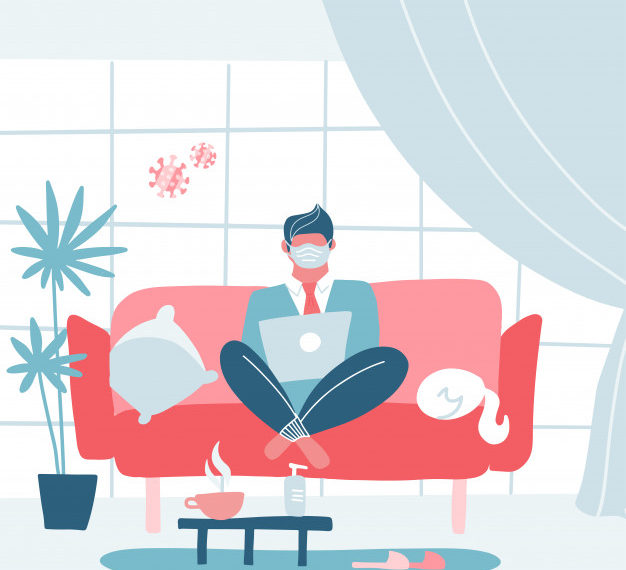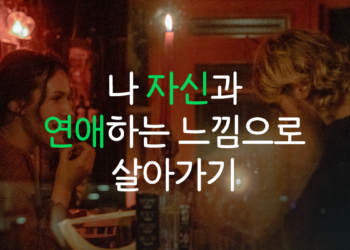Four Ways to Feel Good on a Hard Day in Lockdown
코로나 상황 속에서도 삶의 만족을 찾는 네 가지 방법
New
research suggests how people are bouncing back from the daily challenges of
living with the COVID-19 pandemic.
팬데믹 상황에서 사람들이 일상에서의 어려움으로부터 어떻게 회복하고 있는지를 보여주는 새로운 연구 결과.
MICHAEL PRINZING, BARBARA FREDRICKSON | JUNE 16, 2020
It’s become clichéd to say that these are
challenging times. Everyone knows that many people are more stressed, anxious,
lonely, and depressed than usual. In fact, according to the National Center for
Health Statistics, nearly a third of Americans now show signs of clinical
levels of depression or anxiety. It is entirely reasonable to feel these
things, given what’s going on.
지금이 어려운 시기라고 말하는 것은 진부한 말이 되었다. 많은 사람들이
이 시기에 더 스트레스를 받고, 불안하고, 외롭고, 우울하다는 것은 누구나 알고 있다. 사실, 미국 국립 보건 통계 센터에 따르면, 거의 3분의 1의 미국인들이 현재 우울증이나 불안의 임상적 수준의 징후를
보이고 있다. 현재 진행 중인
상황을 고려할 때, 이런 기분들을 느끼는 것은 놀랄 일이 아니다.
However, we recently conducted a study that
found that, even under these strenuous circumstances, some people are managing
to thrive. At the Positive Emotions and Psychophysiology Lab at UNC Chapel
Hill, our research team has been collecting data from adults around the United
States this spring, starting in April, when most of us were under stay-at-home
orders to flatten the coronavirus curve.
하지만, 우리가 수행한 연구 결과 최근 이러한 힘든 환경 속에서도
몇몇 사람들이 더 행복함을 느끼고 있다는 것을 알게 되었다. UNC 채플힐의 긍정정서 및 정신생리학
연구실의 우리 연구팀은 코로나바이러스 확산 방지를 위해 자택 대피 명령이 내려진 올 봄 4월부터 전
미국의 성인들 자료를 수집해 왔다.
For many people, more of the bad tends to
mean less of the good. If something sad happens on Tuesday, people forget about
what gave them joy on Monday. But research has found that resilient
people—people who handle life’s challenges especially well, and who quickly
bounce back from setbacks—are better able to hold on to the good, even in the
presence of the bad. That is, when faced with challenges, resilient people
don’t avoid negative states, thinking everything is fine. Rather, even while
feeling stress, anxiety, loneliness, and depression, the resilient among us
continue feeling love, gratitude, joy, and hope. Accepting (not suppressing)
negative emotion is part of what it means to be resilient.
대부분의 사람들에게, ‘나쁜 것’들이
많아진다는 것은 ‘좋은 것’들이 줄어든다는 의미일 것이다. 화요일에 슬픈 일이 생기면 월요일에 즐거움을 주었던 일들을 잊어버린다. 그러나
연구에 따르면 삶에서 겪는 어려움들을 잘 처리하고 좌절에서 빨리 회복하는 사람들, 즉 회복탄력성이 있는
사람들은 나쁜 일을 겪을 때에도 긍정적인 가치를 계속해서 추구할 수 있다고 한다. 다시 말해, 어려움에 직면했을 때, 회복력이 있는 사람들은 모든 것이 괜찮다고
생각하면서 부정적인 상태를 피하지 않는다. 우리들 중 회복탄력성이 좋은 사람들은 스트레스, 불안, 외로움, 우울함을
느끼는 동안에도 오히려 사랑, 감사, 기쁨, 희망을 계속 느끼고 있다. 부정적인 감정을 받아들이고 억제하지 않는
것은 회복력이 있다는 것의 일부다.
Our team’s research has also shown that
resilience is not a fixed trait. The good news is that we can cultivate it.
Resilience increases as people experience more frequent positive emotions. Like
an upward spiral, positive emotions lead to greater resilience, which leads to
more positive emotions. So, the question is, how can you experience more
positive emotions—even with the world in its current state? Here are some of
the insights the data revealed.
탄력성은 고정된 특성이 아니라는 것을 알 수 있었다. 좋은 소식은
우리가 회복탄력성을 성장시킬 수 있다는 것이다. 긍정적인 감정을 더 자주 경험할수록 회복력은 증가한다. 위로 올라가는 나선형처럼 긍정적인 감정은 복원력이 더 커지게 되고, 이는
더 긍정적인 감정으로 이어진다. 그렇다면 문제는 어떻게 하면 더 긍정적인 감정을 경험할 수 있는가 하는
것이다. 심지어 코로나19가 유행하는 현재와 같은 상태에서
말이다. 데이터를 통해 얻은 다음과 같은 통찰들이 있다.
1. Set aside time to take care of your
body, mind, and spirit
1. 몸과 마음과 정신을 챙기는 시간을 따로 둘 것.
Exercise, hobbies, and prayer or meditation
tend to bring positive emotions for young and old alike, and for those living
alone or with others.
운동, 취미, 기도나 명상은
혼자 사는 사람이든, 가족 또는 누군가와 함께 사는 사람이든 남녀노소 모두에게 긍정적인 감정을 가져오는
경향이 있다.
Of course, most people know that these
activities are important. But they are especially important these days. The tie
between time spent on these sorts of activities and positive emotions is
particularly strong for people experiencing more negative emotions.
물론 대부분의 사람들은 이러한 활동이 중요하다는 것을 알고 있다. 요즘
상황에 특히 더 중요하다. 운동, 취미, 명상 등의 활동에 소비되는 시간과 긍정적인 감정 사이의 연관성은 부정적인 감정을 많이 경험하는 사람들에게 특히
강하다.
So, the more stressed, anxious, lonely, or
depressed you are, the more it matters that you take time to exercise and care
for yourself. One strategy that we, the authors, have found useful is to put
repeating events in our calendars. That way, we’ve always got blocks of time
dedicated to these things, as well as automated reminders.
그래서 스트레스를 받거나, 불안하거나, 외롭거나, 우울할수록, 운동하고
자신을 돌보는 데 시간을 갖는 것이 더 중요하다. 운동이나 명상 등을 반복적인 습관으로 만들어, 달력이나 다이어리에 적어 관리하는 것도 한 가지의 전략이 될 수 있다. 이렇게
하면, 우리는 항상 자동화된 알림뿐 아니라 이러한 것들에 전념할 수 있는 시간 블록을 갖게 된다
2. Help others
2. 타인을 도울 것
That being said, it’s important not to
become too self-focused. Regardless of how much time people spent taking care
of themselves, we found that those who go out of their way to help others also
experience more positive emotions. Crises provide ample opportunities for
kindness. You can donate face masks or other equipment to health care workers.
If you’re healthy, you can donate much-needed blood, or buy groceries and other
necessities for elderly and high-risk neighbors. Such altruistic acts aren’t
just good for those receiving help. They’re good for those giving it, as well.
말하자면, 너무 자기 중심적이 되지 않는 것이 중요하다. 우리는 사람들이 자신을 돌보는 데 시간을 보낸 정도와 상관없이, 다른
사람들을 돕는 데 자신을 희생하는 사람들도 긍정적인 감정을 더 많이 경험한다는 것을 발견했다. 위기는
친절을 베풀 충분한 기회를 제공한다. 마스크나 기타 위생 장비를 의료 종사자들에게 기부할 수 있다. 건강하다면 헌혈을 하거나, 노약자나 고위험군에속한 이웃을 위해 식료품과
기타 생필품을 살 수 있다. 그런 이타적인 행동은 도움을 받는 사람들에게만 좋은 것이 아니며, 도움을 주는 사람들에게도 좋다.
That’s because we humans are deeply social
creatures. During the COVID-19 pandemic, the buzzword has been “social
distancing.” Yet social connection is vital for a person’s health and
happiness.
그것은 우리 인간이 깊은 사회적 생물이기 때문이다. COVID-19가
유행하는 이 기간동안, “사회적 거리두기”는 꼭 지켜야 할
일이 되었다. 물리적으로는 거리를 두더라도, 사회적 연결은
한 개인의 건강과 행복을 위해 필수적이다.
3. Get on social media—but minimize passive
scrolling
3. 소셜 미디어를 이용하되, ‘수동적 스크롤’을 최소화할 것
can be very important for staying connected while physically distanced. But it
needs to be used properly. Our data showed that the amount of time people spend
passively browsing social media (scrolling through feeds, looking for updates)
is unrelated to positive states, but instead strongly linked to anxiety and
other negative feelings.
페이스북이나 트위터와 같은 소셜 미디어는 물리적으로는 거리를 두면서도 사회적으로는 연결된상태를 유지하는 데 매우
중요한 역할을 한다. 하지만 적절하게 사용되어야 한다. 우리의
데이터는 사람들이 소셜 미디어를 수동적으로 이용하는 데 소비하는 시간(피드를 내리면서 보기만 하고, 새로운 업데이트를 찾는 시간)은 긍정적인 상태와 무관하며 불안 등의
부정적인 정서들과 강하게 연관되어 있다는 것을 보여주었다.
Now, social media can be useful for sharing
messages of hope and solidarity. And it is, even now, being used to help
organize people fighting for justice. But social media feeds are also typically
filled with distressing news and politicking. We need to be careful not to
spend too much time passively monitoring them.
소셜미디어는 희망과 연대의 메시지를 공유하는 데 유용할 수 있다. 그리고
지금도 정의를 위해 싸우는 사람들을 조직하는 데 이용되고 있다. 그러나 SNS의 피드, 포스트들은 전형적으로 부정적인 뉴스와 정치적인 선동, 공작으로 가득 차 있다. SNS를 이용하는 시간이 수동적으로 정보를
받아들이기만 하는 시간이 되지 않도록 주의할 필요가 있다.
On the other hand, actively interacting
with others comes with more positive and fewer negative emotions. We found that
was just as true for introverts as it was for extraverts, and for those living
alone as well as those living with others.
반면에, 다른 사람들과 적극적으로 상호작용하는 것은 긍정적인 정서를
불러일으키며 부정적인 정서를 덜 가지고 온다. 우리는 이러한 경향이 외향적인 사람들과 내향적인 사람들, 혼자 사는 사람과 누군가와 같이 사는 사람들 모두에게서 나타난다는 것을 알 수 있었다.
4. Meet face to face, even if you’re six
feet apart
4. 2미터 이상의 거리를 두더라도, 서로 만날 것.
It does, however, matter how one is
interacting. Social media will never be enough. On average, time spent
interacting face to face comes with more positive emotions, whereas time spent
in voice or video calls, or text-based interaction (email, texting, etc.) does
not. This seems to be because it’s far easier to establish a meaningful
connection with someone when you are face to face.
타인과 적극적으로 상호작용 할 때 긍정적인 정서를 느끼는 것은 사람이 어떻게 상호작용을 하느냐에 달려있다. 소셜 미디어를 통한 소통으로 가능은 하겠지만, 결코 충분하지는 않을
것이다. 평균적으로 얼굴을 맞대고 상호작용하는 시간은 긍정적인 정서를 더 많이 일으키는 반면, 음성이나 영상 통화, 문자 기반 상호작용(이메일, 문자 등)에서
소비되는 시간은 그렇지 못하다. 얼굴을 마주할 때 누군가와 의미 있는 관계를 맺는 것이 훨씬 쉽기 때문인
것 같다.
We found that the link between interaction
time and positive emotions is accounted for by the feelings of connection and
care for others that were experienced while interacting, which are lower in
calling and text-based interactions. In other words, what matters is not how much
time you spend with others, but rather the quality of the emotional connection
you forge with them.
우리는 사람들 사이의 상호작용 시간과 긍정적인 감정 사이의 연관성은 그 관계에서 경험했던 배려나 소속감 등의
감정들에 의해 설명된다는 것을 발견했으며, 통화와 문자 기반의 상호작용에서는 그 연관성이 더 낮게 나타났다. 즉, 중요한 것은 당신이 다른 사람들과 얼마나 많은 시간을 보내느냐가
아니라 그들과 맺어주는 감정적 연결의 질이다.
These connections seem to have long-term
consequences, too, beyond just having a good day today.
실제로 만나서 상호작용을 하는 것은 단순히 오늘 좋은 하루를 보내는 것 이상의 장기적인 결과도 가지고 있는 것으로 보인다.
One of the projects we’re currently working
on in our lab looks at the link between social interaction and mental health
over the course of multiple weeks this past spring. As mentioned above, past
research has shown that frequent positive emotions help resilient people to
thrive even in times of crisis. What we’re now discovering is that
co-experienced positive emotions—the good feelings that you get when you really
connect with someone—seem to be even more important than positive emotions
experienced alone.
현재 우리 연구실에서 진행 중인 프로젝트 중 하나는 지난 봄, 수
주 동안의 사회적 상호작용과 정신 건강 사이의 연관성을 살펴본 것이다. 위에서 언급했듯이, 과거의 연구는 잦은 긍정적인 감정은 회복력이 있는 사람들이 위기 상황에서도 마음이 번창할 수 있도록 돕는다는 것을 보여주었다. 우리가 지금 발견하고 있는 것은 사람들 사이에서 공통적으로 경험된 긍정적인 정서, 즉 누군가와 진정으로 연결되었을 때 얻게 되는 좋은 정서들이 혼자 경험하는 긍정적인 정서보다 훨씬 더 중요하다는
것이다.
Our current research is suggesting that,
over the long term, resilient people sustain the positive aspects of mental
health (happiness and a sense of life’s meaning and purpose) and avoid the
negative aspects (depression, anxiety, loneliness, and stress) in part by
finding moments of positive connection in day-to-day life.
우리가 현재 진행하는 연구 결과를 보면, 장기간에 걸쳐 회복력이 있는
사람들이 정신건강의 긍정적인 측면(행복과 삶의 의미와 목적의 감각)을
유지하고, 부분적으로 일상생활에서 긍정적인 연결의 순간을 추구함으로써 부정적인 측면(우울감, 불안, 외로움, 스트레스)을 덜 느낄 수 있다.
It doesn’t take long to forge these
connections. In fact, we’ve discovered that the number and duration of
interactions are not what matters. Rather it’s quality over quantity—the
benefits of socializing come largely from the emotional connection you make
with another person. During these “challenging times,” it’s even more important
than usual that people stay connected and help each other.
이런 사회적 연결을 만드는 것은 오래 걸리는 일이 아니다. 사실, 우리는 상호 작용의 수와 지속 시간이 중요한 것이 아니라는 것을 발견했다. 오히려
시간의 양보다는 관계의 질이 중요하다. 사회화의 이점은 주로 우리가 다른 사람과 감정적인 관계를 맺는
데서 온다. 지금과 같은 어려운 시기 동안에 사람들이 계속 연결되어 서로를 돕는 것은 평소보다 훨씬
더 중요하다.
※원문 바로가기: https://greatergood.berkeley.edu/article/item/four_ways_to_feel_good_on_a_hard_day_in_lockdown




![[연구참여자 모집/사례 지급] 자유연상 패턴과 심리적 속성 간의 관계 탐색](https://happyfinder.co.kr/wp-content/uploads/2024/05/워드프레스_연구참여자모집-360x180.png)













